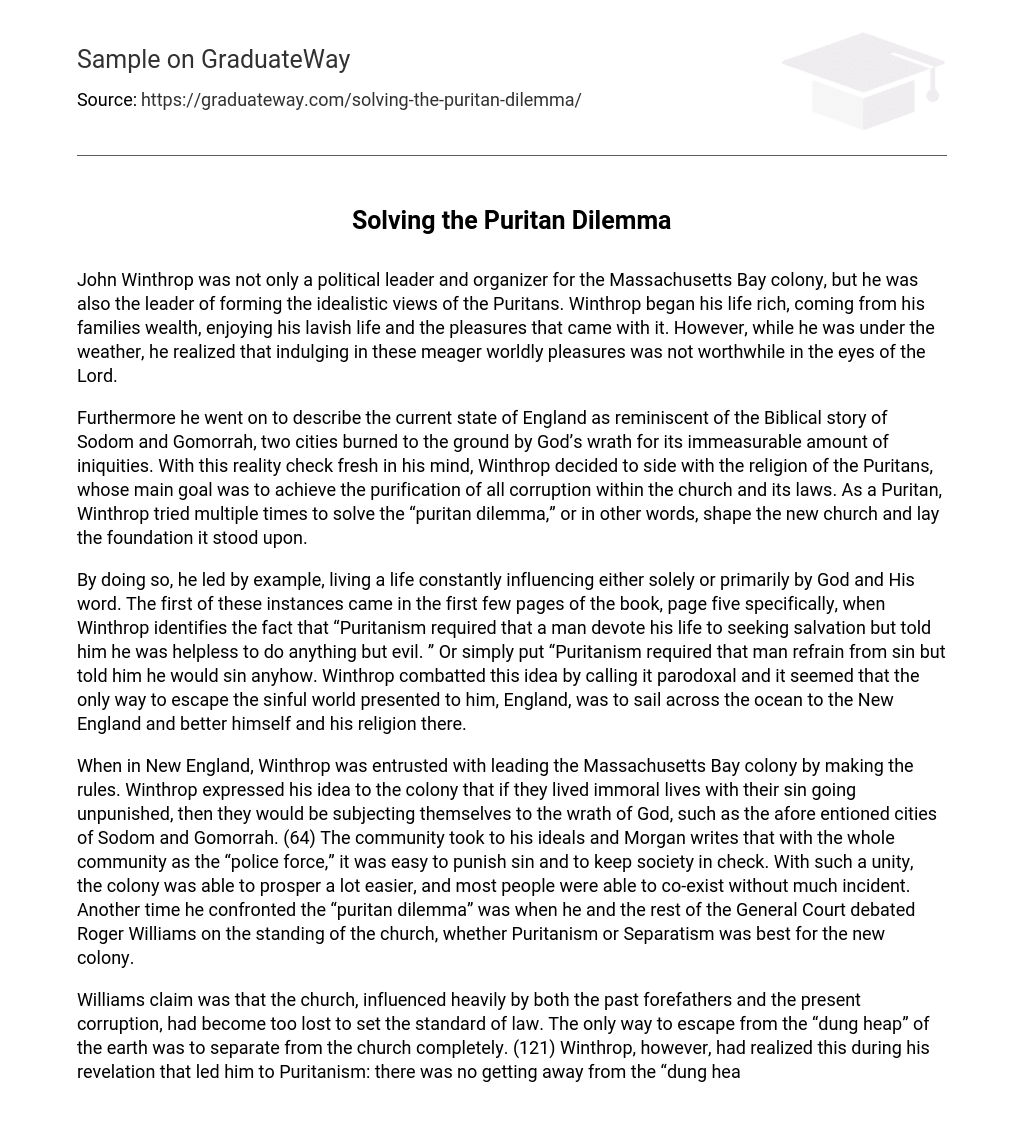John Winthrop was a political leader and organizer for the Massachusetts Bay colony who played a significant role in shaping the idealistic beliefs of the Puritans. He held multiple roles within the colony and initially enjoyed a luxurious life, thanks to his family’s wealth, where he indulged in worldly pleasures. However, during an illness, he realized that such gratification held little value in God’s eyes.
In addition, he made a comparison between the present condition of England and the Biblical tale of Sodom and Gomorrah. In this story, God destroyed these cities because they were sinful. This analogy influenced Winthrop to identify with the Puritan faith, which sought to purify the church and its laws from corruption. As a Puritan, Winthrop endeavored multiple times to address the “puritan dilemma” and lay down the foundations upon which the new church was constructed.
Winthrop’s life was constantly guided by God and His word, setting an example for others. On page five of the book, he recognized that “Puritanism required that a man devote his life to seeking salvation but told him he was helpless to do anything but evil.” In simpler terms, Puritanism demanded righteousness while acknowledging human fallibility. Winthrop saw this as paradoxical and believed that journeying to New England offered a way to escape sin and enhance one’s religious convictions.
Winthrop assumed leadership in the Massachusetts Bay colony while in New England. He was responsible for establishing rules and believed that immoral behavior without consequences would invite God’s wrath, as seen in Sodom and Gomorrah. The community embraced his principles, acting as a “police force” to punish sins and maintain order. This unity allowed the colony to thrive and individuals coexisted peacefully. Winthrop encountered another instance of the “puritan dilemma” when debating with Roger Williams and the General Court about the church’s position, considering Puritanism versus Separatism for the colony.
Williams argued that the church, influenced by both past leaders and present corruption, had become too corrupted to establish the standard of law. To escape from the earth’s degraded state, complete separation from the church was necessary (121). On the other hand, Winthrop came to this realization during his revelation that led him to Puritanism: it was impossible to escape the earth’s degradation because sin and immorality are always present. Winthrop believed that the only way to improve the colony’s foundation was to draw from past knowledge and purify it.
Review the law and religion of the motherland and eliminate any harmful material deemed incorrect or motivated by personal gain. In fact, Winthrop himself was dismayed when Williams was subsequently expelled from the colony due to his beliefs. Winthrop recognized the value of having someone like Williams who demonstrated great zeal and dedication to their cause. This instance of empathy exemplifies the collective mindset of the Massachusetts Bay colony: act in accordance with God’s will rather than pursuing personal interests.
Despite facing personal and societal challenges, Winthrop remained steadfast in his Puritan beliefs during a critical period in chapter 12. As the Great Migration was coming to an end, some settlers were abandoning their settlements and returning to England, while financial troubles arose for Winthrop due to a servant’s error. However, Winthrop maintained his unwavering conviction that the colony he was instrumental in founding would not only be a good place, but an improved one. He refused to surrender or retreat from his commitments.
Despite the frightening realization that he had previously praised England as a favorable location, and now resided in the Massachusetts Bay colony thousands of miles away in order to escape a country plagued by religious corruption, Winthrop remained in accordance with his faith and stayed where he believed God directed him. This decision resulted in his continued presence amidst political turmoil, as the state actively sought to expand its judicial and legislative authority over the region. Once again, Winthrop’s unwavering trust in God was evident.
He constantly reminded himself that if God had intended for him, his neighbor, the supply ships, or the entire colony to fail, it would have happened. Nonetheless, the colony persevered, just as Winthrop did with his constant focus on God. Winthrop’s primary devotion was to his faith, and it guided his entire life. The “puritan dilemma” that Winthrop sought to address was how individuals could lead a righteous and untarnished life in the face of numerous temptations and the inherent sinful nature that we all possess.
Throughout his exploits, Winthrop encounters challenges and choices that demand him to trust in the Lord and have faith. This reflects the lifestyle of a Puritan because despite the corruption and deceit within the church, a place considered sacred, they opt for self-purification. They have faith in their society’s capability to discern right from wrong, believe in divine punishment, and trust that their sacred bond with God is sufficient to prevent their colony from suffering the same fate as Sodom and Gomorrah.





